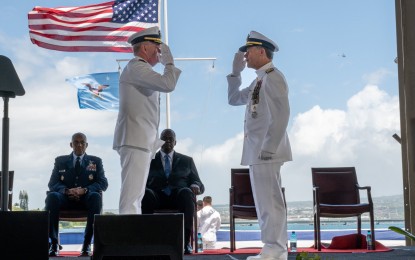
CHANGE OF COMMAND. Admiral Samuel Paparo assumes the command of the US Indopacom from Admiral John Aquilino during a change of command ceremony at Joint Base Pearl Harbor- Hickam in Hawaii on Friday (May 3, 2024). Paparo said the command needs to answer the continued "grey zone" operations of China in the West Philippine Sea. (Photo courtesy of US Indopacom/MC1 John Bellino)
PEARL HARBOR, Hawaii – New United States Indo-Pacific Command (USIndopacom) chief Admiral Samuel Paparo has cited China’s “grey zone activities” as acts the US must be ready to answer.
Paparo’s statement came right after he replaced Admiral John Aquilino as US Indopacom commander during a change of command ceremony presided by US Defense Secretary Lloyd Austin III at the Joint Base Pearl Harbor-Hickam in the Hawaiian island of Oahu on May 3 (Hawaii time).
“Our world faces a complex problem set in the troubling actions of the People’s Republic of China (PRC) and its rapid build-up of forces. We must be ready to answer the PRC’s increasingly intrusive and expansionist claims in the Indo-Pacific region,” Paparo said.
“Some call it the grey zone. My friend General (Romeo) Brawner from the Republic of the Philippines has a phrase called ICAD and he has renamed grey zone, which sounds otherwise benign and dull into ICAD which is Illegal, Coercive, Aggressive, and Deceptive,” he added.
Security and maritime law experts define grey zone operations as tactics or activities that are below the threshold of what constitute an aggression to prevent the country from using self-defense.
In the West Philippine Sea, experts see Beijing’s dangerous use of coast guards and maritime militia vessels, and water cannons against Filipino civilian vessels as examples of grey zone tactics.
Paparo said the Indopacom will also concentrate on ways to help partners maintain peace while safeguarding their sovereign rights.
“We will safeguard the international order characterized by transparency, cooperation, fair competition, and the rule of law. We’ll bring all to bear in all domains, harnessing an integrated capability supporting partnerships to maintain peace and security while safeguard sovereign rights,” he said.
Speaking before high-ranking foreign military leaders, including Armed Forces of the Philippines chief Gen. Romeo Brawner Jr., Paparo said the US Indopacom under his command will continue working in concert with US allies and partners to preserve a free and open Indo-Pacific.
“[W]e’ll strive for the peaceful resolution of any crisis or conflict but make no mistake, we will be ready to fight any adversary that threatens the peace, security, stability and well-being of the nation and of our allies and partners,” he said.
“The team is uniquely ready to shape the current strategic environment to our nation and our allies and partners’ advantage,” he added.
Austin likewise mentioned China’s “increasingly coercive behavior” in the East and South China Seas, along the Line of Actual Control with India, and the Taiwan Strait, among others.
“You know, the PRC is the only country with both the will -- and, increasingly, the capacity -- to dominate the Indo-Pacific and to reshape the global order to suit its autocratic vision. And that's why the PRC remains the Department's pacing challenge,” he said in his speech.
The Indopacom is America’s oldest and largest combatant command responsible for an area described by Austin as a “priority theater of operations” for the US.
It consists of at least 380,000 soldiers, sailors, marines, airmen, guardians, coast guardsmen, and US Department of Defense civilians. (PNA)
